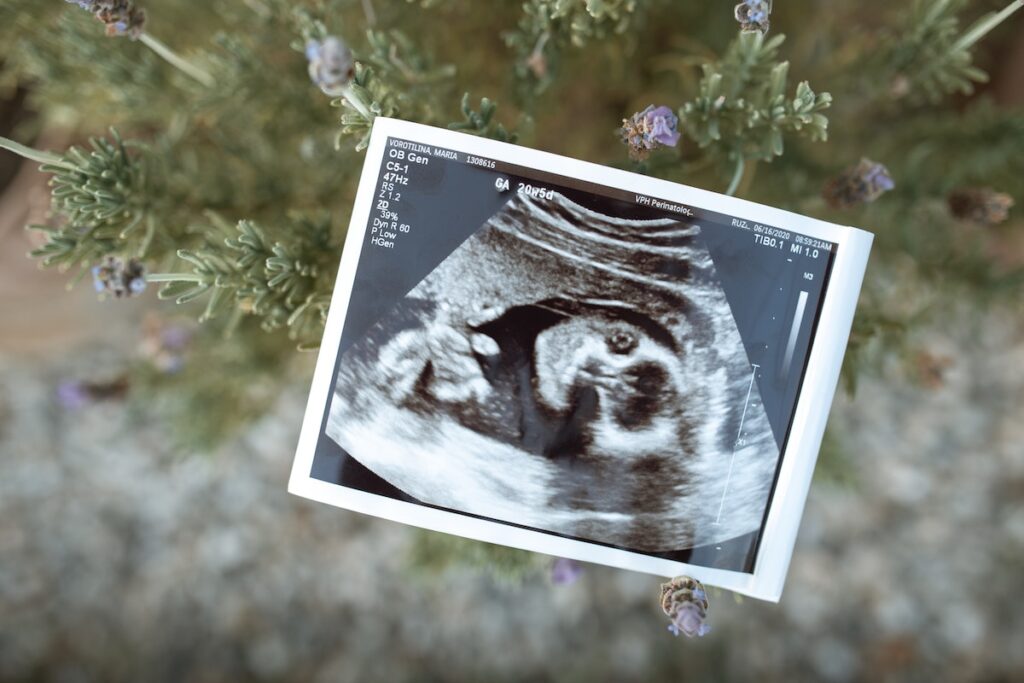Congratulations! You’re pregnant! Pregnancy is an exciting period, and you might wonder what to expect during pregnancy. This article offers an in-depth pregnancy timeline encompassing all pregnancy stages and fetal development phases, from the initial weeks until the final stretch. We’ll also cover the critical fetal milestones, maternal health concerns, and changes you can expect to experience during your pregnancy. So, let’s dive in!
Pregnancy Timeline in Detail
The pregnancy process is complex and encompasses fetus growth and development inside the mother’s uterus. It typically lasts about 40 weeks, or nine months, and is divided into three trimesters marked by changes in fetal development and maternal health.
In this section, we’ll provide a detailed timeline of pregnancy that covers each trimester and highlights some of the critical milestones and concerns.
What is Prenatal Development?
The process of prenatal development (fetal growth) encompasses the various alterations that occur in an embryo or fetus from conception until delivery. This period involves a progression of cell division and specialization of the fertilized egg that culminates in the birth of a fully developed infant.
Prenatal development is divided into three main stages:
- The Germinal Stage: The embryonic stage lasts from week 3 to week 8 of pregnancy, during which the major organs and body systems begin to form
- The Embryonic Stage:The germinal stage lasts for the first two weeks of pregnancy, during which the fertilized egg implants in the uterus and begins to divide.
- The Fetal Stage:The fetal stage lasts from week 9 to birth, during which the fetus grows and matures in preparation for delivery.
How Long is the Average Pregnancy?
The average pregnancy lasts for around 40 weeks, or 280 days, from the first day of the mother’s last menstrual period. However, not all pregnancies last precisely 40 weeks. Some babies are born earlier or later than expected, affecting their health and development
What are the Three Trimesters of Pregnancy?
The three trimesters of pregnancy are classified as follows:
- First trimester: Weeks 1-12
- Second trimester: Weeks 13-28
- Third trimester: Weeks 29-40
Understanding the key milestones and concerns during each trimester can help expectant parents prepare for their pregnancy.
What to Expect in the Different Pregnancy Stages
Knowing what to expect in each stage of pregnancy can help you prepare physically, mentally, and emotionally. Here’s a month-by-month guide to the different stages of pregnancy:
- First Trimester (Weeks 1-12)
The first trimester is the most critical stage of pregnancy. Your body undergoes significant changes during this time, and your baby’s development begins. Here’s a breakdown of what to expect each month:

Month 1 (Weeks 1-4)
- At this stage, you may not know that you’re pregnant yet. Your baby is just a fertilized egg that has implanted in your uterus.
- You may experience pregnancy symptoms such as fatigue, nausea, and breast tenderness.
- It’s essential to start taking prenatal vitamins and folic acid to support your baby’s development.
Month 2 (Weeks 5-8)
- Your baby is now called an embryo and is about the size of a kidney bean.
- Your body produces more pregnancy hormones, which can cause morning sickness and mood swings.
- Your baby’s major organs and systems begin to develop, including the nervous, digestive, and circulatory systems.
Month 3 (Weeks 9-12)
- Your baby is now called a fetus and is about the size of a lime.
- Your baby’s fingers, toes, and facial features start to form.
- You may feel more energized as your body adjusts to the pregnancy hormones.
- Second Trimester (Weeks 13-28)
The second trimester is often called the “honeymoon phase” of pregnancy. You may feel better and more energized during this time. Here’s what to expect each month:
Month 4 (Weeks 13-16)
- Your baby is now approximately the size of an avocado.
- You may start to notice and feel your baby move for the first time.
- Your healthcare provider may offer you a screening test to check for genetic disorders.
Month 5 (Weeks 17-20)
- Your baby is now approximately the size of a sweet potato.
- You may start to feel more significant movements, known as quickening.
- Your healthcare provider may offer you an anatomy scan to check your baby’s development.
Month 6 (Weeks 21-24)
- Your baby is now approximately the size of an ear of corn.
- Your baby’s lungs are developing, and they may start to practice breathing movements.
- You may begin to experience Braxton Hicks contractions, which are practice contractions.
- Third Trimester (Weeks 29-40)
Congratulations, you’ve made it to the final stretch of your pregnancy journey! As you approach the end of your third trimester, you may be experiencing a mix of excitement, anticipation, and anxiety. This is when your baby will enter the world, and it’s essential to prepare for the changes and challenges that come with childbirth.
Most importantly, your baby gets ready for life outside the womb, and your body prepares for labor and delivery. Here’s what to expect each month:
Month 7 (Weeks 25-28)
- Your baby is now approximately the size of an eggplant.
- Your baby’s eyes can now open and close.
- You may experience more significant discomforts, such as back pain and shortness of breath.
Month 8 (Weeks 29-32)
- Your baby is now approximately the size of a butternut squash.
- Your baby’s bones are hardening, and they may start to move into the head-down position for delivery.
- Your healthcare provider may begin to do cervical checks to monitor your progress.
Month 9 (Weeks 33-40)
- Your baby is now approximately the size of a watermelon.
- Your baby is now considered full-term and can arrive any day now. They will weigh around 6-9 pounds and measure approximately 19-21 inches in length.
- At this stage, your baby’s lungs will be fully developed, and they will be able to regulate their body temperature. You may experience symptoms such as fatigue, pelvic discomfort, and more frequent contractions as your body prepares for labor.
It’s important to remember that not all pregnancies are the same, and every woman’s journey is unique. It’s essential to consult with your healthcare provider and stay informed about your baby’s development, changes in your body, and any potential complications that may arise.
Frequently Asked Questions

What are The Key Maternal Health Concerns During Each Trimester?
Different maternal health concerns also mark each trimester. Here are some examples:
First trimester: During this time, the mother may experience common pregnancy symptoms such as nausea, fatigue, and breast tenderness. She should also receive early prenatal care to ensure the health of her and her baby.
Second trimester: The mother may experience fewer symptoms and feel more energetic during this time. She should continue to receive prenatal care and monitor her weight gain and blood pressure.
Third trimester: The mother may experience more physical discomfort during this time and prepare for delivery. She should monitor her baby’s movements and attend regular prenatal appointments to check for signs of complications.
What Are The Key Fetal Milestones During Each Trimester?
Different fetal milestones mark each trimester. Here are some examples:
First trimester: During this period, the fertilized egg implants in the uterus and develops into an embryo. By the end of the first trimester, the embryo has formed significant organs and body systems, including the heart, brain, and nervous system.
Second trimester: During this time, the fetus grows rapidly and develops more advanced capabilities, such as hearing and tasting. By the end of the second trimester, the fetus can open and close its eyes and has a chance of survival outside the womb.
Third trimester: During this time, the fetus grows and matures in preparation for birth. Its principal organs are fully formed, and it begins to practice breathing and other skills necessary for survival outside the womb.
Which is the Most Critical Month in Pregnancy?
While every pregnancy stage is essential, one critical month is particularly crucial for fetal development. According to research, the first trimester, specifically the first eight weeks, is the most critical period for fetal development. During this time, the embryo rapidly develops, and all the major organs and systems are forming.
Studies have shown that exposure to harmful substances, such as alcohol, tobacco, and certain medications, during the first trimester can lead to significant congenital disabilities and developmental abnormalities (ACOG). That’s why it’s crucial to prioritize prenatal care during this period and avoid any substances that could harm your baby’s development.
It’s also important to note that taking prenatal vitamins, regular exercise, and eating a healthy diet rich in nutrients can support fetal development and reduce the risk of complications during pregnancy (March of Dimes).

In summary, while all months of pregnancy are essential, the first trimester is the most critical for fetal development. Prioritizing prenatal care, avoiding harmful substances, and supporting a healthy pregnancy can help ensure a successful pregnancy journey and the birth of a healthy baby.
Bottom Line
In conclusion, understanding the different stages of pregnancy is crucial for expecting parents. It helps to provide insight into the changes happening in the mother’s body and the baby’s growth and development. With this knowledge, parents can take proactive steps to ensure a healthy pregnancy.
During the first trimester, which lasts from weeks 1-12, the embryo undergoes rapid development, and all the major organs and systems start to form. During the second trimester, which lasts from weeks 13-27, the fetus grows and develops, and the mother’s body goes through significant changes. During the third trimester, which lasts from weeks 28-40, the fetus’s growth and development accelerate, and the mother may experience uncomfortable symptoms as she prepares for labor and delivery.
It’s essential to keep in mind that every pregnancy is different, and every woman’s experience will vary. However, by knowing what to expect during each stage of pregnancy, parents can take the necessary steps to ensure a healthy pregnancy journey and the birth of a healthy baby.












